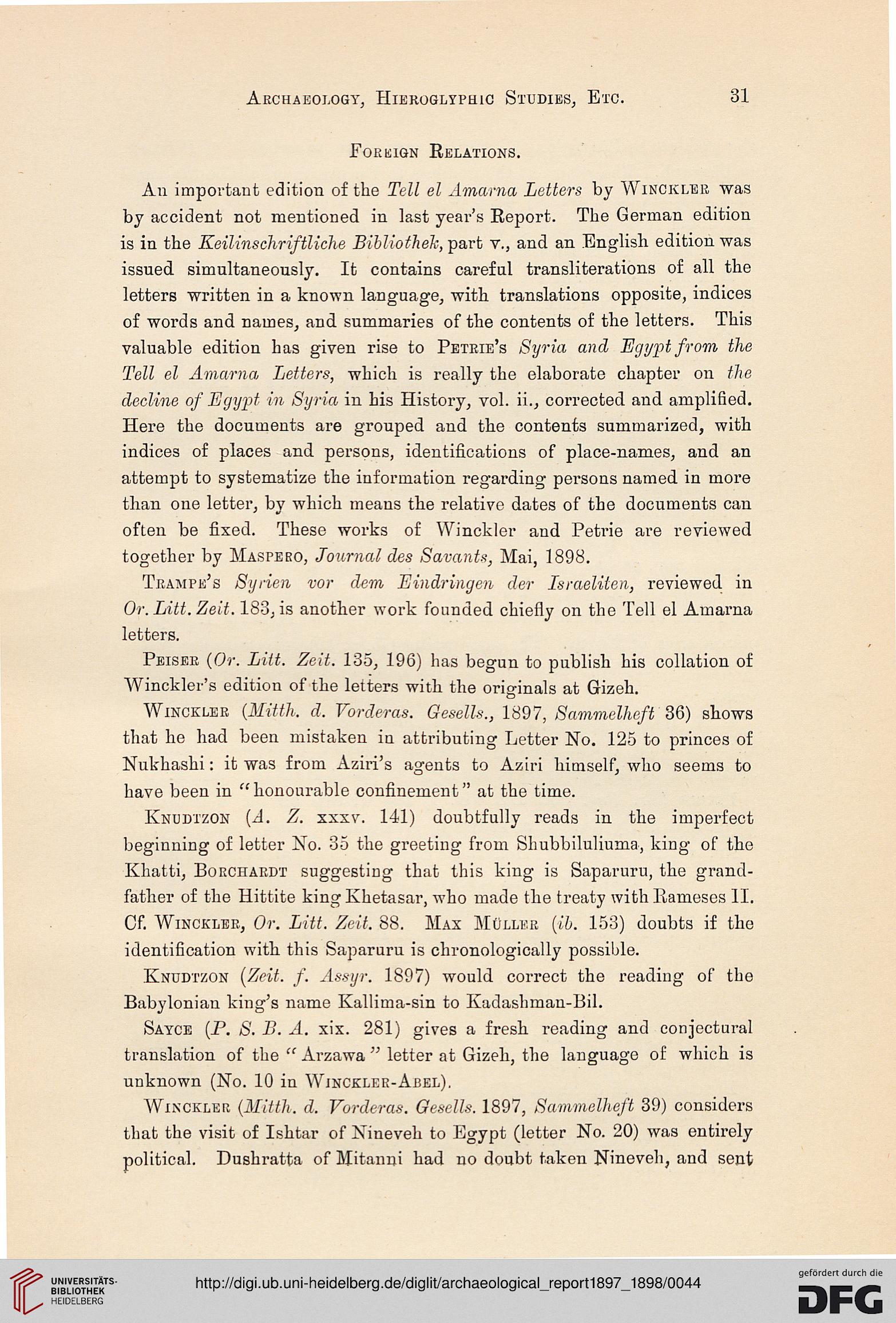Archaeology, Hieroglyphic
Studies, Etc.
31
Foreign Eelations.
An importaut edition of the Tell el Amarna Letters by Winckler was
by accident not mentioned in last year's Beport. The German edition
is in the Keilinschriftliche Bibliothek, part v., and an English edition was
issued simultaneously. It contains careful transliterations of all the
letters written in a known language, with translations opposite, indices
of words and names, and summaries of the contents of the letters. This
valuable edition has given rise to Petrie's Syria and Egypt from the
Tell el Amarna Letters, which is really the elaborate chapter on the
decline of Egypt in Syria in his History, vol. ii., corrected and amplified.
Here the documents are grouped and the contents summarized, with
indices of places and persons, identifications of place-names, and an
attempt to systematize the information regarding persons named in more
than one letter, by which means the relative dates of the documents can
often be fixed. These works of Winckler and Petrie are reviewed
together by Maspero, Journal des Savants, Mai, 1898.
Trampe's Syrien vor dem Eindringen der Israeliten, reviewed in
Or. Litt. Zeit. 183, is another work founded chiefly on the Tell el Amarna
letters.
Peiser (Or. Lilt. Zeit. 135, 196) has begun to publish his collation of
Winckler's edition of the letters with the originals at Gizeh.
Winckler (Mitth. d. Vorderas. Gesells., 1897, Sammelheft 36) shows
that he had been mistaken in attributing Letter No. 125 to princes of
Nukhashi: it was from Aziri's agents to Aziri himself, who seems to
have been in "honourable confinement" at the time.
Knudtzon (A. Z. xxxv. 141) doubtfully reads in the imperfect
beginning of letter No. 35 the greeting from Shubbiluliuma, king of the
Khatti, Borciiardt suggesting that this king is Saparuru, the grand-
father of the Hittite king Khetasar, who made the treaty with Barneses II.
Of. Winckler, Or. Litt. Zeit. 88. Max Muller (ib. 153) doubts if the
identification with this Saparuru is chronologically possible.
Knudtzon (Zeit. f. Assyr. 1897) would correct the reading of the
Babylonian king's name Kallima-sin to Kadashman-Bil.
Sayce (P. S. B. A. xix. 281) gives a fresh reading and conjectural
translation of the " Arzawa " letter at Gizeh, the language of which is
unknown (No. 10 in Winckler-Abel).
Winckler (Mitth. d. Vorderas. Gesells. 1897, Sammelheft 39) considers
that the visit of Ishtar of Nineveh to Egypt (letter No. 20) was entirely
political. Dushratta of Mitanni had no doubt taken Nineveh, and sent
Studies, Etc.
31
Foreign Eelations.
An importaut edition of the Tell el Amarna Letters by Winckler was
by accident not mentioned in last year's Beport. The German edition
is in the Keilinschriftliche Bibliothek, part v., and an English edition was
issued simultaneously. It contains careful transliterations of all the
letters written in a known language, with translations opposite, indices
of words and names, and summaries of the contents of the letters. This
valuable edition has given rise to Petrie's Syria and Egypt from the
Tell el Amarna Letters, which is really the elaborate chapter on the
decline of Egypt in Syria in his History, vol. ii., corrected and amplified.
Here the documents are grouped and the contents summarized, with
indices of places and persons, identifications of place-names, and an
attempt to systematize the information regarding persons named in more
than one letter, by which means the relative dates of the documents can
often be fixed. These works of Winckler and Petrie are reviewed
together by Maspero, Journal des Savants, Mai, 1898.
Trampe's Syrien vor dem Eindringen der Israeliten, reviewed in
Or. Litt. Zeit. 183, is another work founded chiefly on the Tell el Amarna
letters.
Peiser (Or. Lilt. Zeit. 135, 196) has begun to publish his collation of
Winckler's edition of the letters with the originals at Gizeh.
Winckler (Mitth. d. Vorderas. Gesells., 1897, Sammelheft 36) shows
that he had been mistaken in attributing Letter No. 125 to princes of
Nukhashi: it was from Aziri's agents to Aziri himself, who seems to
have been in "honourable confinement" at the time.
Knudtzon (A. Z. xxxv. 141) doubtfully reads in the imperfect
beginning of letter No. 35 the greeting from Shubbiluliuma, king of the
Khatti, Borciiardt suggesting that this king is Saparuru, the grand-
father of the Hittite king Khetasar, who made the treaty with Barneses II.
Of. Winckler, Or. Litt. Zeit. 88. Max Muller (ib. 153) doubts if the
identification with this Saparuru is chronologically possible.
Knudtzon (Zeit. f. Assyr. 1897) would correct the reading of the
Babylonian king's name Kallima-sin to Kadashman-Bil.
Sayce (P. S. B. A. xix. 281) gives a fresh reading and conjectural
translation of the " Arzawa " letter at Gizeh, the language of which is
unknown (No. 10 in Winckler-Abel).
Winckler (Mitth. d. Vorderas. Gesells. 1897, Sammelheft 39) considers
that the visit of Ishtar of Nineveh to Egypt (letter No. 20) was entirely
political. Dushratta of Mitanni had no doubt taken Nineveh, and sent





